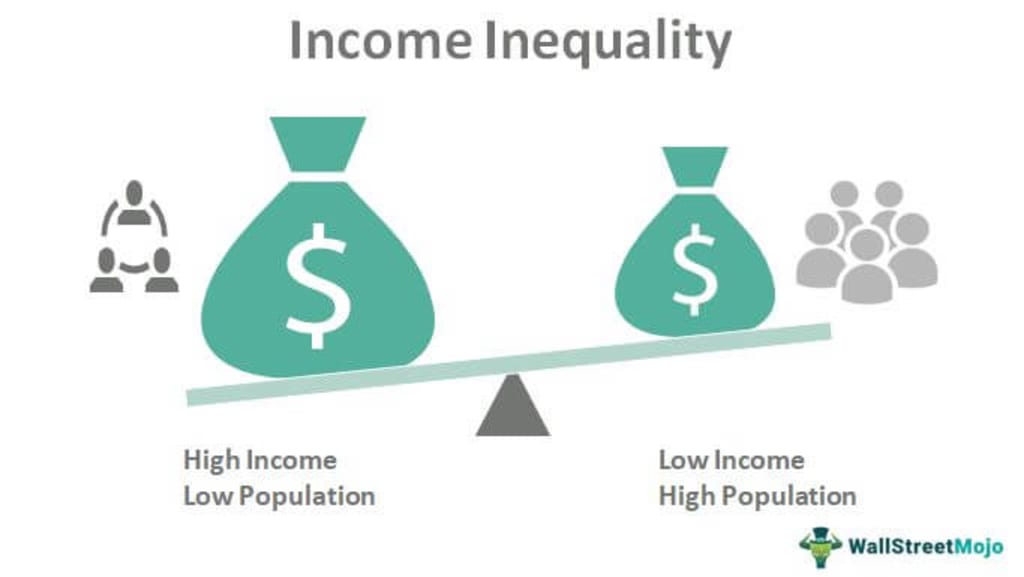Income Inequality: A Complex Issue that Requires a Multi-pronged Approach
Addressing Systemic Barriers and Promoting Equality of Opportunity for a More Just and Prosperous Society

Income inequality has been a topic of discussion and debate for many years. Some argue that it is a natural occurrence and inevitable in any society, while others see it as a major issue that needs to be addressed. In this article, we will explore both sides of the argument and examine the factors that contribute to income inequality.
To begin with, income inequality refers to the unequal distribution of income among individuals or households in a society. It can be measured in different ways, such as the Gini coefficient, which is a statistical measure of inequality. In recent years, income inequality has become a hotly debated topic, especially in developed countries like the United States, where the gap between the rich and the poor has been widening for decades.
One argument is that income inequality is a natural occurrence that is inherent in any capitalist society. According to this view, income inequality is the result of differences in skills, education, and work ethic among individuals. Those who work harder, have more education or skills, and take on more risks are rewarded with higher incomes, while those who lack these qualities earn less. This argument suggests that income inequality is a necessary incentive for people to work hard, innovate, and take risks, which leads to economic growth and prosperity for all.
On the other hand, many argue that income inequality is a major issue that needs to be addressed. They argue that income inequality can lead to social and economic instability, and that it undermines the principles of democracy and equality. According to this view, income inequality is not solely the result of differences in skills and education, but is also the result of systemic factors such as discrimination, lack of access to education and healthcare, and structural barriers that prevent people from achieving their full potential.
There is evidence to support both sides of the argument. While it is true that hard work, education, and skills are important factors that contribute to income, it is also true that there are systemic barriers that prevent some individuals from achieving their full potential. Discrimination, lack of access to education and healthcare, and other structural factors can limit opportunities and prevent individuals from achieving upward mobility. In addition, the growing gap between the rich and the poor can lead to social and economic instability, as those at the bottom of the income ladder may become resentful and disillusioned with the system.
So, what can be done to address income inequality? There is no simple solution, as the problem is complex and multifaceted. However, there are several steps that can be taken to reduce income inequality and promote greater equality of opportunity. Some of these include:
Investing in education: Education is one of the most important factors that contribute to upward mobility. By investing in education and ensuring that everyone has access to high-quality education, we can help to reduce the gap between the rich and the poor.
Addressing systemic barriers: Discrimination, lack of access to healthcare and education, and other structural barriers can limit opportunities and prevent individuals from achieving their full potential. By addressing these barriers, we can promote greater equality of opportunity and reduce income inequality.
Increasing the minimum wage: The minimum wage has not kept up with the cost of living in many countries, which has contributed to income inequality. By increasing the minimum wage, we can help to ensure that everyone earns a living wage and reduce the gap between the rich and the poor.
Progressive taxation: Tax policies can play a role in reducing income inequality. By implementing progressive tax policies that tax the wealthy at a higher rate, we can help to redistribute wealth and reduce the gap between the rich and the poor.
In conclusion, income inequality is a complex and multifaceted issue that is the result of a combination of factors. While it is true that hard work, education, and skills are important factors that contribute to income, it is also true that there are systemic barriers that prevent some individuals from achieving their full potential. Therefore, income inequality is not solely a natural occurrence, but also a major issue that needs to be addressed.
Reducing income inequality requires a multi-pronged approach that addresses both individual and systemic factors. Investing in education, addressing systemic barriers, increasing the minimum wage, and implementing progressive taxation are some of the steps that can be taken to promote greater equality of opportunity and reduce income inequality.
Furthermore, addressing income inequality is not only a matter of social justice, but it is also essential for promoting economic growth and stability. When income is concentrated in the hands of a few, the rest of the population has less disposable income to spend, which can lead to decreased demand for goods and services, and ultimately slower economic growth. On the other hand, when income is more evenly distributed, there is greater demand for goods and services, which can lead to increased economic growth and prosperity for all.
In conclusion, income inequality is a major issue that needs to be addressed. While it is true that hard work, education, and skills are important factors that contribute to income, it is also true that systemic barriers can limit opportunities and prevent individuals from achieving their full potential. Therefore, reducing income inequality requires a multi-pronged approach that addresses both individual and systemic factors. By promoting greater equality of opportunity and reducing income inequality, we can build a more just and prosperous society for all.





Comments
There are no comments for this story
Be the first to respond and start the conversation.